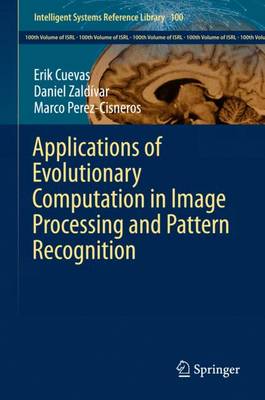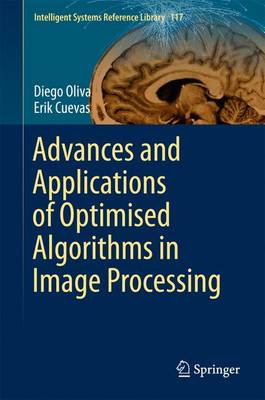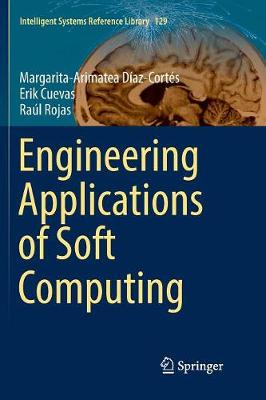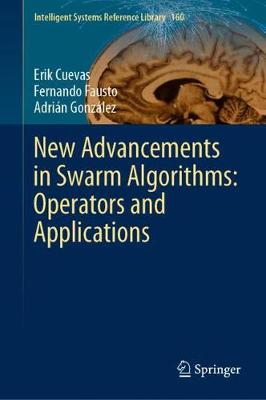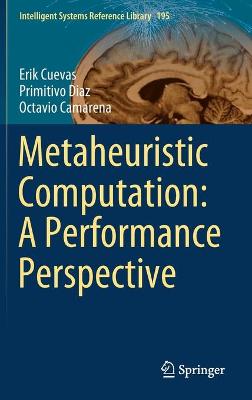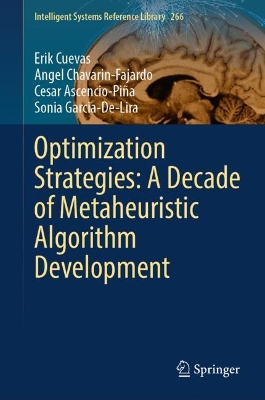Intelligent Systems Reference Library
6 primary works
Book 100
Applications of Evolutionary Computation in Image Processing and Pattern Recognition
by Erik Cuevas, Daniel Zaldivar, and Marco Perez-Cisneros
This book presents the use of efficient Evolutionary Computation (EC) algorithms for solving diverse real-world image processing and pattern recognition problems. It provides an overview of the different aspects of evolutionary methods in order to enable the reader in reaching a global understanding of the field and, in conducting studies on specific evolutionary techniques that are related to applications in image processing and pattern recognition. It explains the basic ideas of the proposed applications in a way that can also be understood by readers outside of the field. Image processing and pattern recognition practitioners who are not evolutionary computation researchers will appreciate the discussed techniques beyond simple theoretical tools since they have been adapted to solve significant problems that commonly arise on such areas. On the other hand, members of the evolutionary computation community can learn the way in which image processing and pattern recognition problems can be translated into an optimization task. The book has been structured so that each chapter can be read independently from the others. It can serve as reference book for students and researchers with basic knowledge in image processing and EC methods.
Book 117
Advances and Applications of Optimised Algorithms in Image Processing
by Diego Oliva and Erik Cuevas
This book presents a study of the use of optimization algorithms in complex image processing problems. The problems selected explore areas ranging from the theory of image segmentation to the detection of complex objects in medical images. Furthermore, the concepts of machine learning and optimization are analyzed to provide an overview of the application of these tools in image processing.
The material has been compiled from a teaching perspective. Accordingly, the book is primarily intended for undergraduate and postgraduate students of Science, Engineering, and Computational Mathematics, and can be used for courses on Artificial Intelligence, Advanced Image Processing, Computational Intelligence, etc. Likewise, the material can be useful for research from the evolutionary computation, artificial intelligence and image processing communities.
Book 129
Engineering Applications of Soft Computing
by Margarita-Arimatea Diaz-Cortes, Erik Cuevas, and Raul Rojas
This book bridges the gap between Soft Computing techniques and their applications to complex engineering problems. In each chapter we endeavor to explain the basic ideas behind the proposed applications in an accessible format for readers who may not possess a background in some of the fields. Therefore, engineers or practitioners who are not familiar with Soft Computing methods will appreciate that the techniques discussed go beyond simple theoretical tools, since they have been adapted to solve significant problems that commonly arise in such areas. At the same time, the book will show members of the Soft Computing community how engineering problems are now being solved and handled with the help of intelligent approaches.
Highlighting new applications and implementations of Soft Computing approaches in various engineering contexts, the book is divided into 12 chapters. Further, it has been structured so that each chapter can be read independently of the others.
Book 160
New Advancements in Swarm Algorithms: Operators and Applications
by Erik Cuevas, Fernando Fausto, and Adrian Gonzalez
This book presents advances in alternative swarm development that have proved to be effective in several complex problems. Swarm intelligence (SI) is a problem-solving methodology that results from the cooperation between a set of agents with similar characteristics. The study of biological entities, such as animals and insects, manifesting social behavior has resulted in several computational models of swarm intelligence. While there are numerous books addressing the most widely known swarm methods, namely ant colony algorithms and particle swarm optimization, those discussing new alternative approaches are rare. The focus on developments based on the simple modification of popular swarm methods overlooks the opportunity to discover new techniques and procedures that can be useful in solving problems formulated by the academic and industrial communities. Presenting various novel swarm methods and their practical applications, the book helps researchers, lecturers, engineers and practitioners solve their own optimization problems.
Book 195
Metaheuristic Computation: A Performance Perspective
by Erik Cuevas, Primitivo Diaz, and Octavio Camarena
This book is primarily intended for undergraduate and postgraduate students of Science, Electrical Engineering, or Computational Mathematics. Metaheuristic search methods are so numerous and varied in terms of design and potential applications; however, for such an abundant family of optimization techniques, there seems to be a question which needs to be answered: Which part of the design in a metaheuristic algorithm contributes more to its better performance? Several works that compare the performance among metaheuristic approaches have been reported in the literature. Nevertheless, they suffer from one of the following limitations: (A)Their conclusions are based on the performance of popular evolutionary approaches over a set of synthetic functions with exact solutions and well-known behaviors, without considering the application context or including recent developments. (B) Their conclusions consider only the comparison of their final results which cannot evaluate the nature of a good or bad balance between exploration and exploitation. The objective of this book is to compare the performance of various metaheuristic techniques when they are faced with complex optimization problems extracted from different engineering domains. The material has been compiled from a teaching perspective.
Book 266
Optimization Strategies: A Decade of Metaheuristic Algorithm Development
by Erik Cuevas, Angel Chavarin-Fajardo, Cesar Ascencio-Piña, and Sonia Garcia-De-Lira
This book is to explore the development of metaheuristic algorithms over the past decade, focusing on key advancements in their components and structural features, which have driven progress in search techniques. This analysis aims to provide readers with a thorough understanding of the fundamental aspects of these methods, which are essential for their practical application. To offer a broad perspective on the evolution of metaheuristic algorithms, this book reviews 11 specific algorithms developed by the evolutionary computation group at the University of Guadalajara over the past 10 years. These algorithms illustrate the most significant mechanisms and structures discussed in the academic and research communities during their development. By studying these examples, readers will gain valuable insights into the innovative methods and strategic improvements that have shaped the field. The book is designed from a teaching standpoint, making it suitable for undergraduate and postgraduate students in science, electrical engineering, or computational mathematics. Moreover, engineering practitioners unfamiliar with metaheuristic computation will appreciate how these techniques have been adapted to address complex real-world engineering problems, moving beyond theoretical constructs.
